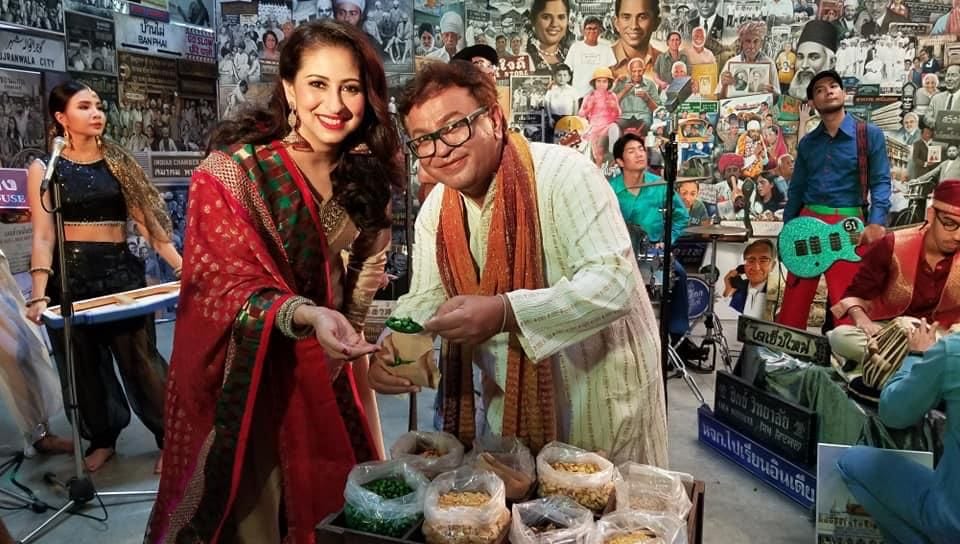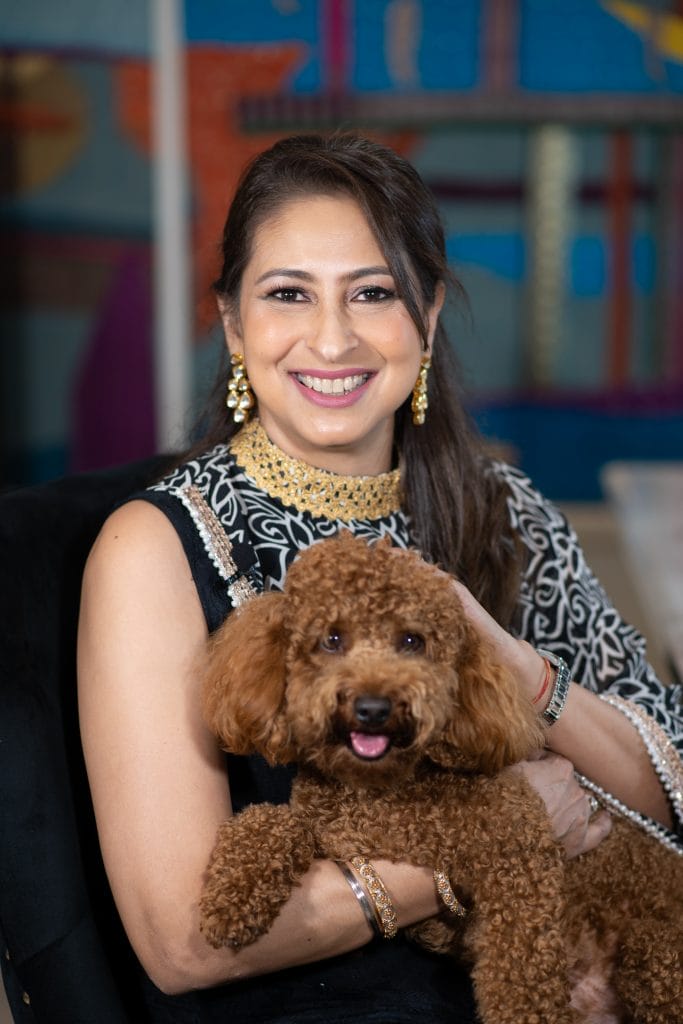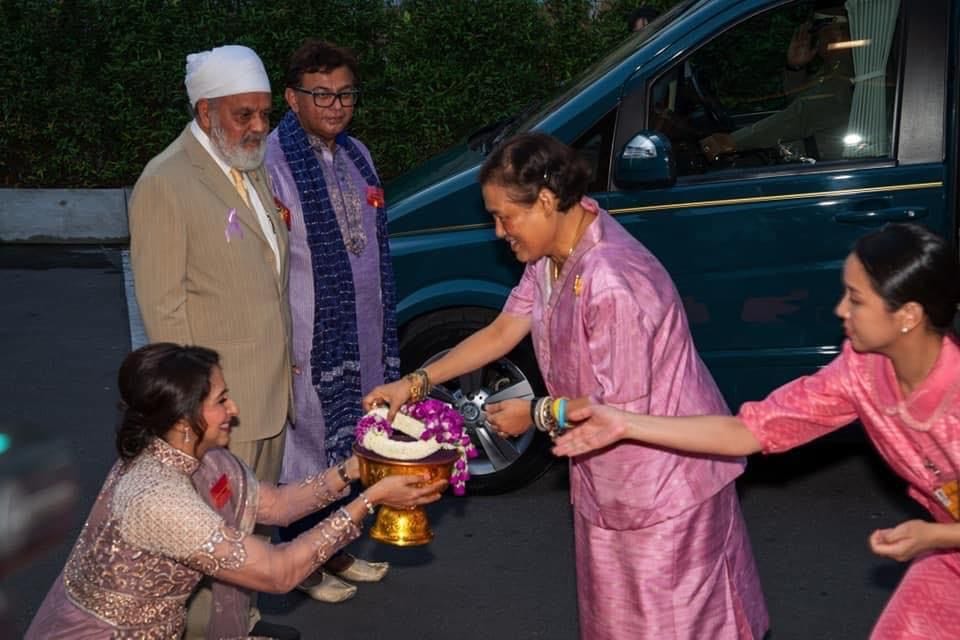Exploring the sound of music.
By Aiden Jewelle Gonzales
I communicate much better through music,” is one of the first things Aruni Bagga tells me with a melodic laugh when I interviewed her at her beautifully-designed home, one which clearly houses a creative soul. “For me, music is more than communication or therapy – everything in this universe starts from a sound. A beat. Listen to your own heartbeat. It has a rhythm. Even when you sigh; that has music in it. When you speak; it has notes. Music is everywhere. It’s the divine in us.” This impassioned speech is interrupted by her family dog, Patchi, barking at somethingoutside and Aruni laughs. “That’s music too!” she quips.
Born in Khon Kaen to a Thai-Sikh family, Aruni is the youngest of four siblings, and she considers music to be in her lifeblood. “Music has been running in my family for generations, since my great- grandfather’s time,” she recalls.
“No day would be complete without our family listening to, and discussing, music. I’d absorbed my family’s passion at a very young age, and it has stayed with me till today. I always loved to sing. I have such clear memories of climbing up a big bench in my mum’s kitchen and using it as my stage; I’d sing and dance. Performing was in my blood! And I thought, one day I want to be a singer.”
Despite this conviction, Aruni never thought she would be a professional singer and performer, one that is now a renowned name among the Thai-Indian community and beyond. Although she studied Gurbani Kirtan during her school days and dabbled in other instruments spanning the sitar, dilruba, tanpura and tabla, she didn’t pursue music for her higher education, and after completing her education in TSIS, she got married early and had kids, and dedicated the first half of her life to them. “But after a certain time, I decided that you can never stop following your dreams; and my vision was to be a singer,” she tells me. “My guru’s guru, from London, asked me frankly one day, ‘What are you doing with your life? Of course you can sing, but you should take it to another level.’
“At that point, I’d won a few singing competitions, but the first step I took to becoming a professional singer was when I recorded my album, Sound of Sufi, in Mumbai. A lot of celebrities came for its debut, and I performed in front of them – that was a moment to remember. Then opportunities came, and movie offers came, and I haven’t looked back since. Still, nothing comes easy in life, and it wasn’t a smooth road in the beginning, but all the struggles I’ve endured have moulded me into the artist I am today.”
Over a generous spread of samosas and masala chai, Aruni waxes eloquently about what music means to her and the role that community has played in her musical journey, bursting into song sporadically; a true nightingale in human form.
What is your favourite form of musical expression, and how do you feel that it connects with people?
I started off with the harmonium, and I explored a range of instruments, but I never wanted to be a jack of all trades and master of none. Therefore, I decided to focus more on singing and used the harmonium as an accompaniment for my vocals, which I still do today. I sing in multiple genres, such as gurbani, ghazals, Bollywood, Sufi, Punjabi, Western, and Thai. As a result, I feel that I’m able to cater to all kinds of music listeners and lovers.
However, most of my albums to date have been in Indian genres, as I was trained in Indian classical: Wade Mere Sahiba produced by Baldave Singh Leo was gurbani kirtan; Ibtadaa, a duet album with Bobby Rishi, with music composed by Pandit Vishwa Prakash from the UK was ghazal; and The Sound of Sufi with music composed by Rajeev Mahavir was, of course, a Sufi album.
So I’m really excited about the album I’m working on, called Return Home, which will be my first-ever Thai album from record label Classy Records. Thailand was where I started, and I realised that it was time for me to come home, musically. It really speaks to my different identities and to the identities of the community here.
Another method of musical expression has been song writing by translating Thai songs into Hindi. I was offered the chance to sing in a movie, and the producer wanted me to sing a Hindi version of a Thai folk song. I thought I’d try it, and the lyrics just came – because I do have a deep understanding of Thai. It’s another way that my roots have influenced my musical journey.

What about when you perform for the community in largescale community events? What do you love most about it, and how has this helped you connect to the Thai- Indian community here?
Performing in largescale events really lifts my spirits and gives me excitement. Knowing that the crowd expects good music from you, it is my responsibility to live up to those expectations and spread my love and happiness to them. However, I equally enjoy performing for small-scale events too, as you feel more connected to the audience and can be more interactive on a personal level.
Who or what are your musical inspirations?
For me, my biggest inspiration would undoubtedly be my father. Observing him listening to and enjoying music by the great maestros of his time allowed me to develop similar interest in their music. In classical music, my highest inspiration is Padma Bhushan and Ustad Bade Ghulam Ali Khan. For ghazals, I look up to Mehdi Hassan Khan, Ghulam Ali, Jagjit Singh, and Chitra Singh. As for Bollywood music, my idols would be none other than Lata Mangeshkar and Asha Bhosle.
You’ve also been in movies. Can you tell us about your past experiences there? What movies have you been in, and what role do you usually play?
A Thai movie, Pohn Jak Fah (A Gift), produced by GDH in 2016, was the first humble opportunity that came to me. I was privileged to have sung a Hindi version of a popular Thai folk song and acted in a cameo role – as myself! Another song that I had rendered was a composition by the late King Rama 9, which was the highest blessing for me.

Later, in 2019, I was offered to sing and act in a leading role in a short musical film, Khaek Pai Krai Ma. This film was part of an exhibition that depicts the lives of the Indian diaspora in Thailand. It was conceptualised and produced by Navin Rawanchaikul from StudioK in Chiang Mai.
The experience of shooting both movies was full of fun. They reflected my true personality and it made the process easy in a way. I got to meet some brilliant actors as well. Overall, they were truly unforgettable experiences.
How did you navigate the COVID years as a performer?
Every dark cloud has a silver lining. I feel It has taught us to take a step back and really appreciate what you have, as well as reconnect with yourself and your loved ones. During the pandemic, we did online Kirtan through live streams, for instance, and it helped people to connect with the Almighty and His nature. I also had the honour to collaborate with popular Thai singer, Tik Shiro, on a song, “Stay Home”, with all proceeds going to charity.
Over the years, what accomplishments are you most proud of?
My proudest accomplishment would be having won the 1995 Sa Re Ga Ma Pa singing competition held in Thailand, and judged by Sonu Nigam. Furthermore, in 2008, I got to represent Thailand in Mumbai after winning the Star Voice of India audition in Bangkok. However, more than pride, I was deeply honoured when HRH Princess Maha Chakri Sirindhorn came to visit the Khaek Pai Krai Ma exhibition and watch the movie with much appreciation of our work. During the exhibition, I was able to tell her a little about my family’s history coming to Thailand and the history of the community – that was one of those moments that you’ll remember for the rest of your life!









